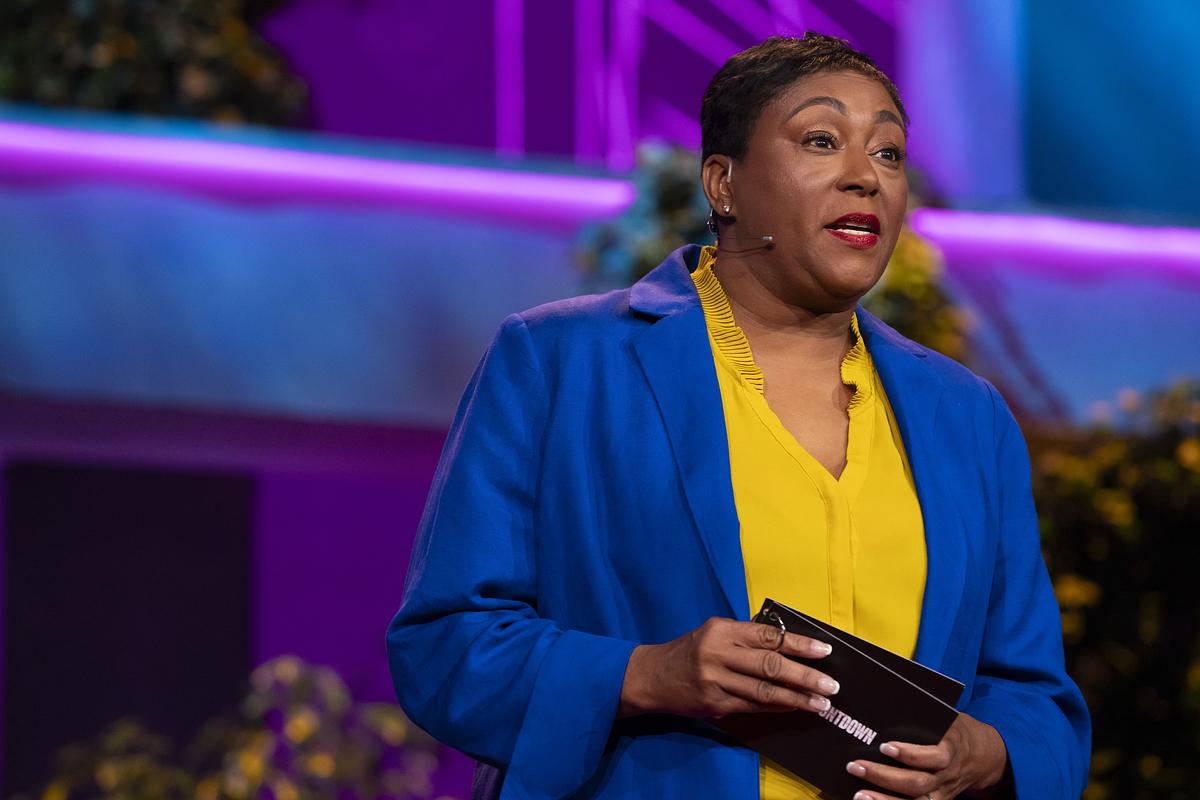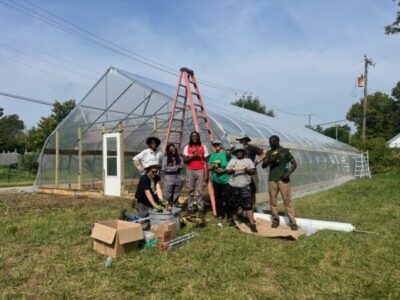
Ford Motor Company is aiming to be carbon neutral by 2050, as reiterated by Cynthia Williams last week.
Williams took to the stage to expand on how Ford is accomplishing this, highlighting their latest releases in electric vehicles (EV). Williams is the global director of sustainability at Ford. She is also a member of Michigan’s climate solution council, put together by Governor Gretchen Whitmer, and is part of the board of directors for CALSTART and VELOZ, two nonprofit organizations working to develop and promote clean, efficient transportation solutions.
Williams joined Great Lakes Now to expand on her TED talk, and why the automotive industry can be the driving force in making Detroit a hub for climate change solutions.
What do you hope the biggest takeaway is from your TED talk this week?
Williams: I think the biggest thing I’d like for folks to takeaway, is that their choices matter. Choosing a more environmentally friendly vehicle matters. The benefits that I described of the vehicles, I’m hoping that they’ll be shared with others to get interested, and gain momentum for the electric vehicle revolution. We’re going to need to bring everyone along with us in order to make sure that we have a cleaner and healthier planet, for decades to come.
Could you tell us a bit more about these new environmentally friendly products coming to market at Ford?
Williams: Ford chose to build off our current products. We’re connecting with customers that way. So we chose to electrify our most iconic vehicles first, like the Mustang and F-150 truck. I drive the Mustang Mach-E, and it’s all electric. It’s instant torque is zero to 60, in 3.5 seconds. It’s a really, really cool design, and it’s really fun to drive. I love driving my vehicle. The best part of going home after a long day’s work is knowing that I can drive right past the gas station. Knowing that I could plug-in and get a full charge overnight. So that’s one of the things that I love about it.
The F-150 Lightning can power your house for up to 10 days. To me, the benefit there is to just imagine folks in rural areas that wouldn’t need a generator if their power went out. People who drive electric vehicles can also light and heat up a campsite, they can charge up a work area or construction site, they can supercharge a tailgate party, and they can even charge another vehicle. So these are all better experiences and provide greater benefits for our customers.
Why is this important to Ford? And why now?
Williams: Well, I think for Ford it has been important to us for many, many years. I believe our first sustainability report was in 1999. I remember because that’s the year my daughter was born. So we’ve been reporting on our sustainability efforts for a long time. I remember working with our research and advanced engineering folks back in 2007. So we’ve been working on it for a long time.
I said yesterday, I’ve been working in the sustainability area 30 or the 31 years of my career here at Ford, and to go from aspiration to reality and see the vehicles hit the road? I think that’s good to see and it’s good to experience. Now, we’re at a point of acceleration to the adoption of electric vehicles, and many, many more are coming on board. So, I think we have a real turning point and we have an opportunity here to address the unprecedented environmental crisis.
What are all the areas that Ford is adapting, when it comes to becoming more environmentally conscious?
Williams: So, our goal is to become carbon neutral no later than 2050. To do that, we’re going to attack over 95% of our carbon emissions–that’s our plan to reduce. That’s not only vehicles, but it’s also our facilities and our supply chain. Knowing that reaching down our supply chain, we’re going to bring all those areas along. Our goals for all of our facilities, new and existing, is to make sure that we conserve and reuse water, that we’re using 100% carbon free electricity, and we’re sending zero waste to landfill. So lots of investment there and also with the supply chain.
We’ll need to build a responsible supply chain, especially as we build out the EV strategy. There’s lots of different things that you have to do, we have to change our manufacturing processes, we have to change how we source new materials, for the vehicles in the batteries that will power them. And again, we’ll have to make sure that we’re doing it responsibly. So we have to work with our suppliers to make sure that we’re bringing them along with us.
What do you think about TED having their climate summit in Detroit? Why Detroit?
Williams: Well, I think it’s the perfect place. This is where the birth of the automotive industry is. I think we have a lot to contribute. Having us on board, and bringing others along with us. We can’t solve this problem alone, just us autos, but we’re a huge part of it. Bringing us together with governments, advocacy groups, all the key stakeholders that can help accelerate and move towards, EV future. I think it’s huge to have it here.
What are the most immediate things that, in your opinion, need to happen in order to prepare Detroit for upcoming environmental changes?
Williams: I think there’s three areas: there’s change, there’s capacity building, and there’s collaboration. So when, when I talk about change, it’s not only we’re gonna have to change the products that we’re bringing to market. Meaning, again, that we’ll have to bring better experiences, greater benefits to the customers. We will also have to change the way we procure materials. The way we manufacture vehicles. The way we do our manufacturing processes. Most of all, we’ll have to change the mindset, the hearts and minds of the customers that are going to be receiving these products.
The capacity piece, we’ll need to build new facilities to meet the demand of these new vehicles. We will have to make sure that the processes are are updated in our in our manufacturing areas, we will have to make sure that we have the right talent, and that we’re working to make sure that we’re upskilling and reskilling workers now so that they’re ready when we start to roll, you know, start to open our new EV plants.
For example, in Tennessee. We are investing, I believe it’s $5 billion in electric vehicle manufacturers for trucks and advanced batteries that power them there. We’re creating 6000 new jobs, and making sure that we have the proper training and education in place is going to be huge–to make sure that we get this right from the start.
I can give you an example of a collaboration, with an unexpected partner, that Ford recently did. That was working with Tesla, to bring more fast chargers to more customers. Again, it’s not going to be your typical alliances with the automotive industry that you typically work with. We’re gonna have to step out of the box, we’re gonna have to innovate, we’re gonna have to work with different partners, particularly the utilities and others that will need to help us as we work out the kinks.
It’s gonna take us all working together, across industry, across the globe, because it’s not going to be about, Ford versus GM, or even about the US versus Asia or Europe. I think we all have to work together in order to make sure that we are building a better future for tomorrow.
What do you see as Detroit’s role in the climate crisis?
Williams: I think it’s largely automotive. The big three are headquartered here, we have the opportunity to respond to this crisis with courage. We have a 120 year history. We know how to scale quickly, and to bring vehicles to customers at scale. That scale piece will help with bringing that cost down. We also have a battery center of excellence, that is working every day on different battery chemistries, so that we can actually bring that price for that battery down. Once we get the price of the battery down, that’s when the price of the vehicles will be more comparable to that of a gasoline vehicle. And so every day, we need to work on that together and make sure that we’re doing the most that we can, to make sure that we can scale up quickly, and get to where we need to be in the 2050 timeframe.
Coming away from this week, what are you feeling optimistic or cautiously optimistic about?
Williams: Well, I feel optimistic because there’s so many people working in this space. So many entrepreneurs, manufacturers, venture capitalists even reached out to me, while I was at the tech conference this week. All wanting to know: how can we help, how can we work together? How can we solve this climate crisis together? To me, that’s the biggest piece of it. When we’re working together, we will solve this crisis quickly. And again, we will be able to accelerate to a zero emissions future. I think that’s the best piece of it.
I think there’s a lot we still need to do in terms of educating consumers about the benefits, making sure that we have the right infrastructure in place so that consumers have no qualms about where they can charge, and things of that sort. Then when they get to that charger, we also have to make sure that we have the policies in place to make sure that these chargers are being maintained. And so, to make sure our customers are satisfied, and we keep them satisfied along this journey, I think those are the big pieces and we still need to work on. But again, we have people working together so I think we definitely can solve this problem.
Catch more news at Great Lakes Now:
TED Countdown: Musician Tunde Olaniran from Flint, Michigan on the role of art in the climate crisis
Featured image: Cynthia Williams speaks at SESSION 5 at TED Countdown Summit. July 11-14, 2023, Detroit, MI. Photo: Jasmina Tomic / TED




